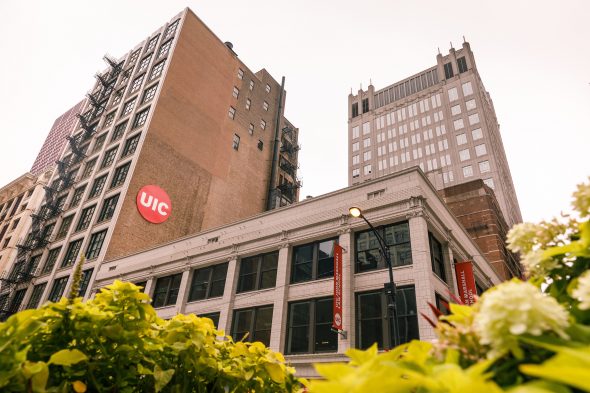UIC John Marshall Law School announces Antiracism and Social Justice Fund

Four full-time faculty members at UIC John Marshall Law School in Chicago have been selected as the inaugural recipients of the law school’s Antiracism and Social Justice Fund. The recipients are associate dean Samuel Jones and professors Renee Hatcher, Cecil Hunt and Hugh Mundy.
The fund, which was established with donor funds in July, supports the work of full-time faculty members by providing funds for them to hire student assistants. In this way, the law school is advancing important antiracism and social-justice projects and affording students the opportunity to contribute and earn money.
As part of their application for funds, each professor agreed to publicize the student position to the full student body and to interview at least three law students before making any offer. At least two students interviewed were from underrepresented racial or ethnic groups. Each professor will also provide their student assistant with a substantive role in the project and to meet with them at least twice a month to review work and provide feedback.
Samuel Jones, a professor and associate dean for SCALES & Inclusive Excellence at UIC Law, will work with students Jacquelin Nunez and Molly Gualandri to draft and revise comprehensive police reform bills and deliver presentations designed to enhance public safety and reduce the impact of systemic racism. Jones, a former U.S. Marine infantryman and U.S. Army Military Police Captain, is a legal expert on police accountability and practices. On Sept. 1, Jones testified before the Illinois Senate and House about police use of force and training.
Renee Hatcher, an assistant professor of law and director of the law school’s Community Enterprise & Solidarity Economy Clinic, is completing a scholarly article titled “Decolonizing Business Associations.” The article addresses how race and a hegemonic Western worldview in U.S. corporate law shape and limit institution-building. To assist Hatcher, student Chynnique Ross will conduct a literature review about Indigenous tribal governance practices, research alternative approaches to institutional governance and other topics, and conduct the cite-check for the article.
Professor Cecil Hunt is completing a law-review article titled “Blood Money: How Black Lives Matter to the Bottom Line of the Prison Industrial Complex.” UIC law student Sara Blackerby will assist Hunt with this article, which will examine the problem of private profiteering from the prison industrial complex that is populated primarily by Black and Brown bodies. The article questions the enormous sums that corporations extract from incarcerated people and their families to purchase products and services that support the basic needs of incarcerated people and support the punishment systems.
Associate professor Hugh Mundy will work with students Mohena Kaur and Erica Fatima on exploring systemic racism embedded in the Federal Rules of Evidence. According to Mundy, common-law rules of evidence were replete with race-based assumptions, biases and limitations. Mundy will write an article examining various rules of evidence used in criminal trials, including their origins, impact on contemporary jury trials and race-based biases. He also will create exercises and assessments for his Evidence course that will challenge students to consider the origins of specific Federal Rules of Evidence and the manner in which they disproportionately affect criminal defendants of color. Mundy intends to use examples of high-profile criminal cases as portrayed in the media to highlight the injustice that can arise from a court’s ostensibly “objective” application of those rules.
Dean Darby Dickerson, who created the fund, is excited about the interest in this fund and this year’s funded projects.
“As Chicago’s public law school and a school with an access mission, we have a duty to explore important yet difficult issues that will help dismantle the systemic racism that exists in legal education, the legal system and the legal profession,” Dickerson said. “The fact that students will be integrally involved in these projects will add an important dimension to our faculty’s work while helping students defray living expenses and develop a professional relationship with one of our talented professors. I look forward to seeing these projects completed, and I have every confidence that each will have a positive impact on our community.”
